2009 CHEVROLET EXPRESS CARGO VAN window
[x] Cancel search: windowPage 239 of 408
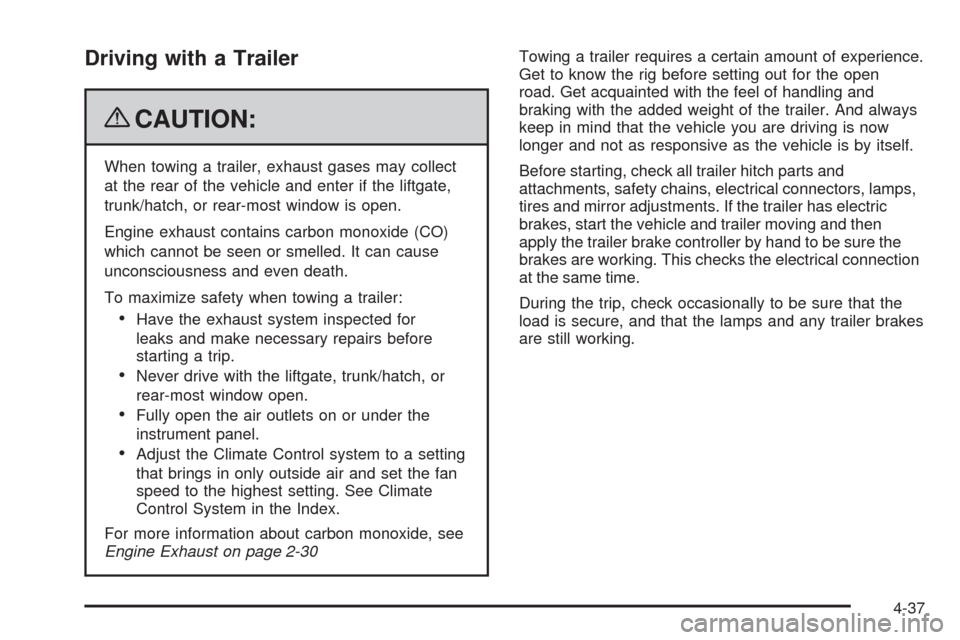
Driving with a Trailer
{CAUTION:
When towing a trailer, exhaust gases may collect
at the rear of the vehicle and enter if the liftgate,
trunk/hatch, or rear-most window is open.
Engine exhaust contains carbon monoxide (CO)
which cannot be seen or smelled. It can cause
unconsciousness and even death.
To maximize safety when towing a trailer:
•Have the exhaust system inspected for
leaks and make necessary repairs before
starting a trip.
•Never drive with the liftgate, trunk/hatch, or
rear-most window open.
•Fully open the air outlets on or under the
instrument panel.
•Adjust the Climate Control system to a setting
that brings in only outside air and set the fan
speed to the highest setting. See Climate
Control System in the Index.
For more information about carbon monoxide, see
Engine Exhaust on page 2-30Towing a trailer requires a certain amount of experience.
Get to know the rig before setting out for the open
road. Get acquainted with the feel of handling and
braking with the added weight of the trailer. And always
keep in mind that the vehicle you are driving is now
longer and not as responsive as the vehicle is by itself.
Before starting, check all trailer hitch parts and
attachments, safety chains, electrical connectors, lamps,
tires and mirror adjustments. If the trailer has electric
brakes, start the vehicle and trailer moving and then
apply the trailer brake controller by hand to be sure the
brakes are working. This checks the electrical connection
at the same time.
During the trip, check occasionally to be sure that the
load is secure, and that the lamps and any trailer brakes
are still working.
4-37
Page 276 of 408
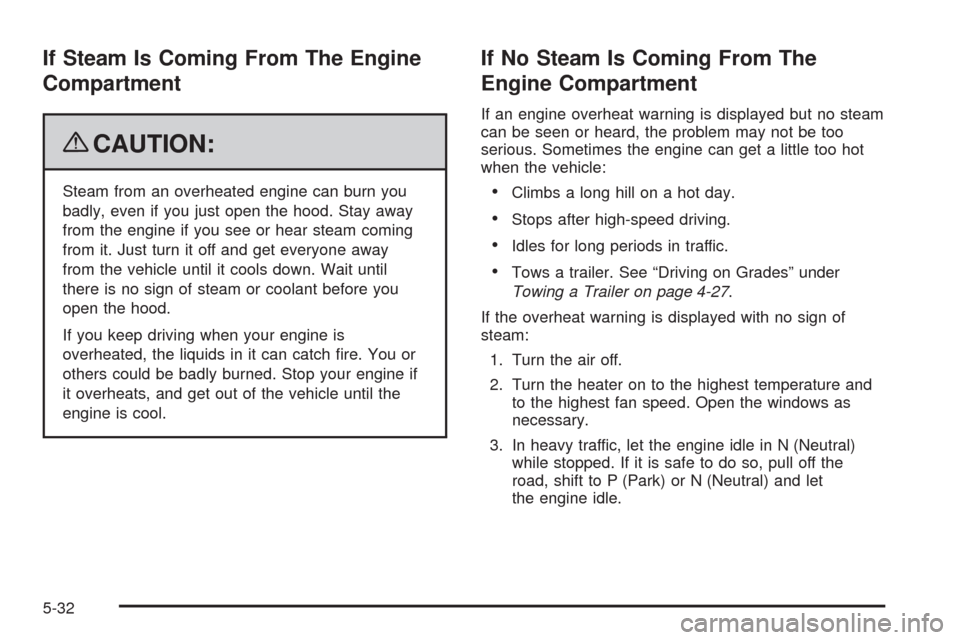
If Steam Is Coming From The Engine
Compartment
{CAUTION:
Steam from an overheated engine can burn you
badly, even if you just open the hood. Stay away
from the engine if you see or hear steam coming
from it. Just turn it off and get everyone away
from the vehicle until it cools down. Wait until
there is no sign of steam or coolant before you
open the hood.
If you keep driving when your engine is
overheated, the liquids in it can catch fire. You or
others could be badly burned. Stop your engine if
it overheats, and get out of the vehicle until the
engine is cool.
If No Steam Is Coming From The
Engine Compartment
If an engine overheat warning is displayed but no steam
can be seen or heard, the problem may not be too
serious. Sometimes the engine can get a little too hot
when the vehicle:
•Climbs a long hill on a hot day.
•Stops after high-speed driving.
•Idles for long periods in traffic.
•Tows a trailer. See “Driving on Grades” under
Towing a Trailer on page 4-27.
If the overheat warning is displayed with no sign of
steam:
1. Turn the air off.
2. Turn the heater on to the highest temperature and
to the highest fan speed. Open the windows as
necessary.
3. In heavy traffic, let the engine idle in N (Neutral)
while stopped. If it is safe to do so, pull off the
road, shift to P (Park) or N (Neutral) and let
the engine idle.
5-32
Page 303 of 408
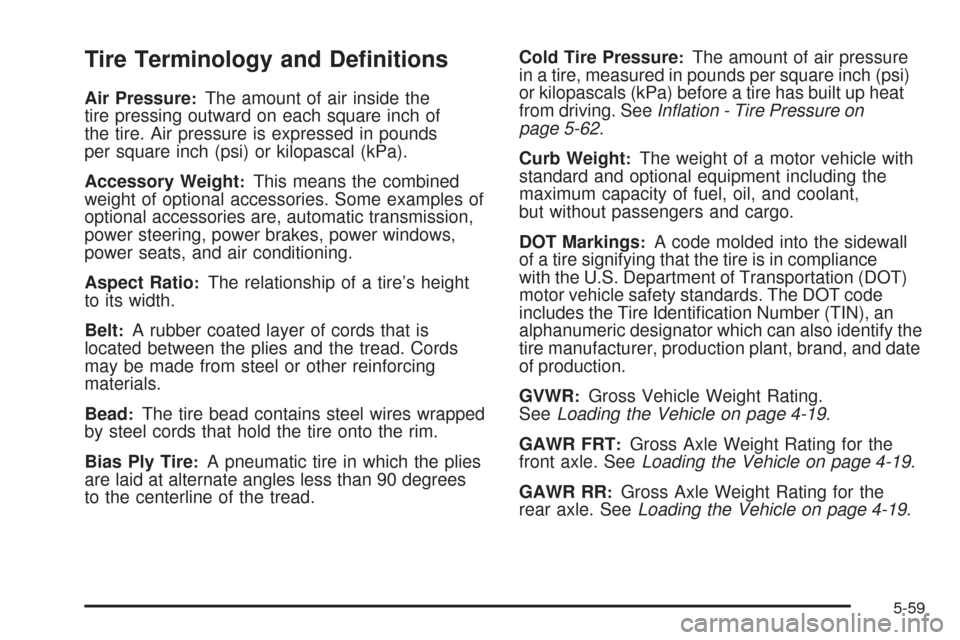
Tire Terminology and De�nitions
Air Pressure:The amount of air inside the
tire pressing outward on each square inch of
the tire. Air pressure is expressed in pounds
per square inch (psi) or kilopascal (kPa).
Accessory Weight
:This means the combined
weight of optional accessories. Some examples of
optional accessories are, automatic transmission,
power steering, power brakes, power windows,
power seats, and air conditioning.
Aspect Ratio
:The relationship of a tire’s height
to its width.
Belt
:A rubber coated layer of cords that is
located between the plies and the tread. Cords
may be made from steel or other reinforcing
materials.
Bead
:The tire bead contains steel wires wrapped
by steel cords that hold the tire onto the rim.
Bias Ply Tire
:A pneumatic tire in which the plies
are laid at alternate angles less than 90 degrees
to the centerline of the tread.Cold Tire Pressure
:The amount of air pressure
in a tire, measured in pounds per square inch (psi)
or kilopascals (kPa) before a tire has built up heat
from driving. SeeInflation - Tire Pressure on
page 5-62.
Curb Weight
:The weight of a motor vehicle with
standard and optional equipment including the
maximum capacity of fuel, oil, and coolant,
but without passengers and cargo.
DOT Markings
:A code molded into the sidewall
of a tire signifying that the tire is in compliance
with the U.S. Department of Transportation (DOT)
motor vehicle safety standards. The DOT code
includes the Tire Identification Number (TIN), an
alphanumeric designator which can also identify the
tire manufacturer, production plant, brand, and date
of production.
GVWR
:Gross Vehicle Weight Rating.
SeeLoading the Vehicle on page 4-19.
GAWR FRT
:Gross Axle Weight Rating for the
front axle. SeeLoading the Vehicle on page 4-19.
GAWR RR
:Gross Axle Weight Rating for the
rear axle. SeeLoading the Vehicle on page 4-19.
5-59
Page 341 of 408
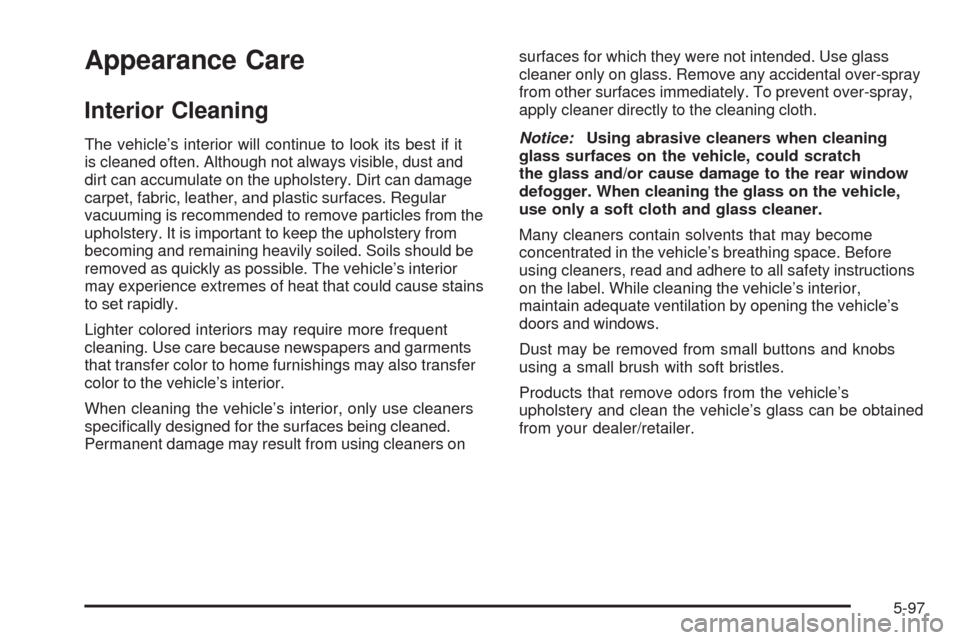
Appearance Care
Interior Cleaning
The vehicle’s interior will continue to look its best if it
is cleaned often. Although not always visible, dust and
dirt can accumulate on the upholstery. Dirt can damage
carpet, fabric, leather, and plastic surfaces. Regular
vacuuming is recommended to remove particles from the
upholstery. It is important to keep the upholstery from
becoming and remaining heavily soiled. Soils should be
removed as quickly as possible. The vehicle’s interior
may experience extremes of heat that could cause stains
to set rapidly.
Lighter colored interiors may require more frequent
cleaning. Use care because newspapers and garments
that transfer color to home furnishings may also transfer
color to the vehicle’s interior.
When cleaning the vehicle’s interior, only use cleaners
specifically designed for the surfaces being cleaned.
Permanent damage may result from using cleaners onsurfaces for which they were not intended. Use glass
cleaner only on glass. Remove any accidental over-spray
from other surfaces immediately. To prevent over-spray,
apply cleaner directly to the cleaning cloth.
Notice:Using abrasive cleaners when cleaning
glass surfaces on the vehicle, could scratch
the glass and/or cause damage to the rear window
defogger. When cleaning the glass on the vehicle,
use only a soft cloth and glass cleaner.
Many cleaners contain solvents that may become
concentrated in the vehicle’s breathing space. Before
using cleaners, read and adhere to all safety instructions
on the label. While cleaning the vehicle’s interior,
maintain adequate ventilation by opening the vehicle’s
doors and windows.
Dust may be removed from small buttons and knobs
using a small brush with soft bristles.
Products that remove odors from the vehicle’s
upholstery and clean the vehicle’s glass can be obtained
from your dealer/retailer.
5-97
Page 351 of 408
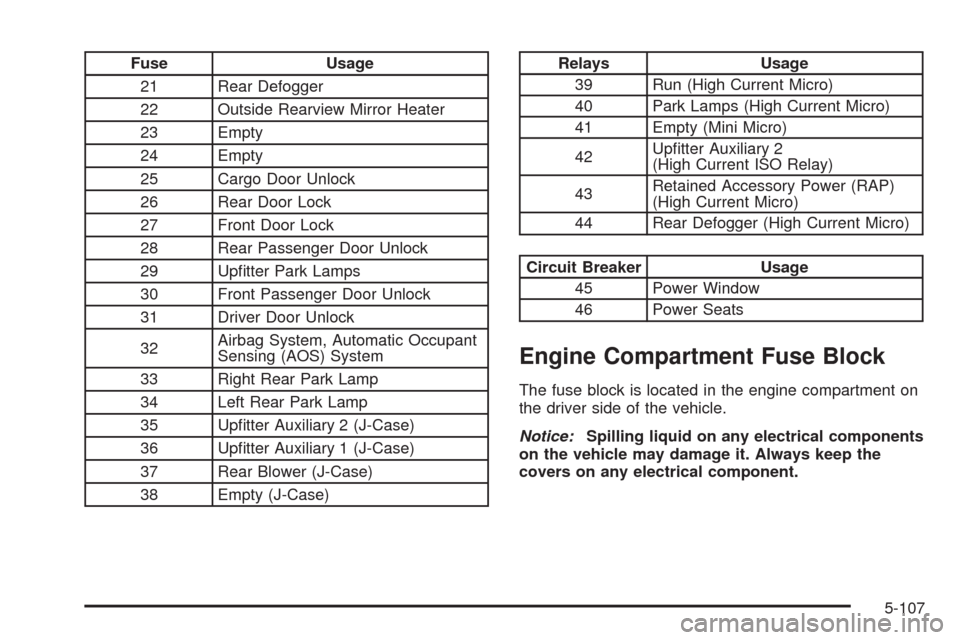
Fuse Usage
21 Rear Defogger
22 Outside Rearview Mirror Heater
23 Empty
24 Empty
25 Cargo Door Unlock
26 Rear Door Lock
27 Front Door Lock
28 Rear Passenger Door Unlock
29 Upfitter Park Lamps
30 Front Passenger Door Unlock
31 Driver Door Unlock
32Airbag System, Automatic Occupant
Sensing (AOS) System
33 Right Rear Park Lamp
34 Left Rear Park Lamp
35 Upfitter Auxiliary 2 (J-Case)
36 Upfitter Auxiliary 1 (J-Case)
37 Rear Blower (J-Case)
38 Empty (J-Case)Relays Usage
39 Run (High Current Micro)
40 Park Lamps (High Current Micro)
41 Empty (Mini Micro)
42Upfitter Auxiliary 2
(High Current ISO Relay)
43Retained Accessory Power (RAP)
(High Current Micro)
44 Rear Defogger (High Current Micro)
Circuit Breaker Usage
45 Power Window
46 Power Seats
Engine Compartment Fuse Block
The fuse block is located in the engine compartment on
the driver side of the vehicle.
Notice:Spilling liquid on any electrical components
on the vehicle may damage it. Always keep the
covers on any electrical component.
5-107
Page 403 of 408
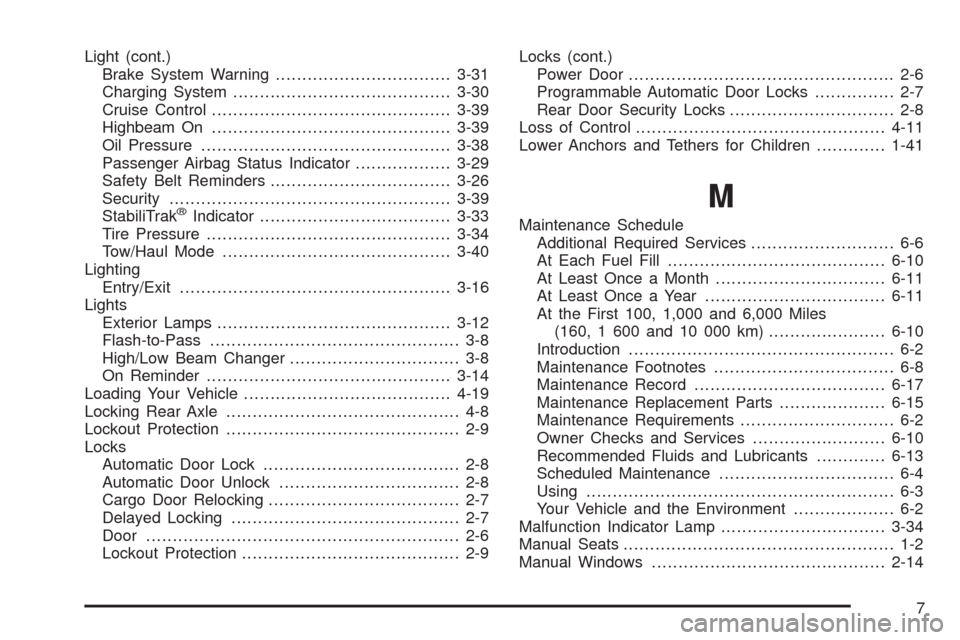
Light (cont.)
Brake System Warning.................................3-31
Charging System.........................................3-30
Cruise Control.............................................3-39
Highbeam On.............................................3-39
Oil Pressure...............................................3-38
Passenger Airbag Status Indicator..................3-29
Safety Belt Reminders..................................3-26
Security.....................................................3-39
StabiliTrak
®Indicator....................................3-33
Tire Pressure..............................................3-34
Tow/Haul Mode ...........................................3-40
Lighting
Entry/Exit...................................................3-16
Lights
Exterior Lamps............................................3-12
Flash-to-Pass............................................... 3-8
High/Low Beam Changer................................ 3-8
On Reminder..............................................3-14
Loading Your Vehicle.......................................4-19
Locking Rear Axle............................................ 4-8
Lockout Protection............................................ 2-9
Locks
Automatic Door Lock..................................... 2-8
Automatic Door Unlock.................................. 2-8
Cargo Door Relocking.................................... 2-7
Delayed Locking........................................... 2-7
Door ........................................................... 2-6
Lockout Protection......................................... 2-9Locks (cont.)
Power Door .................................................. 2-6
Programmable Automatic Door Locks............... 2-7
Rear Door Security Locks............................... 2-8
Loss of Control...............................................4-11
Lower Anchors and Tethers for Children.............1-41M
Maintenance Schedule
Additional Required Services........................... 6-6
At Each Fuel Fill.........................................6-10
At Least Once a Month................................6-11
At Least Once a Year..................................6-11
At the First 100, 1,000 and 6,000 Miles
(160, 1 600 and 10 000 km)......................6-10
Introduction.................................................. 6-2
Maintenance Footnotes.................................. 6-8
Maintenance Record....................................6-17
Maintenance Replacement Parts....................6-15
Maintenance Requirements............................. 6-2
Owner Checks and Services.........................6-10
Recommended Fluids and Lubricants.............6-13
Scheduled Maintenance................................. 6-4
Using.......................................................... 6-3
Your Vehicle and the Environment................... 6-2
Malfunction Indicator Lamp...............................3-34
Manual Seats................................................... 1-2
Manual Windows............................................2-14
7
Page 405 of 408
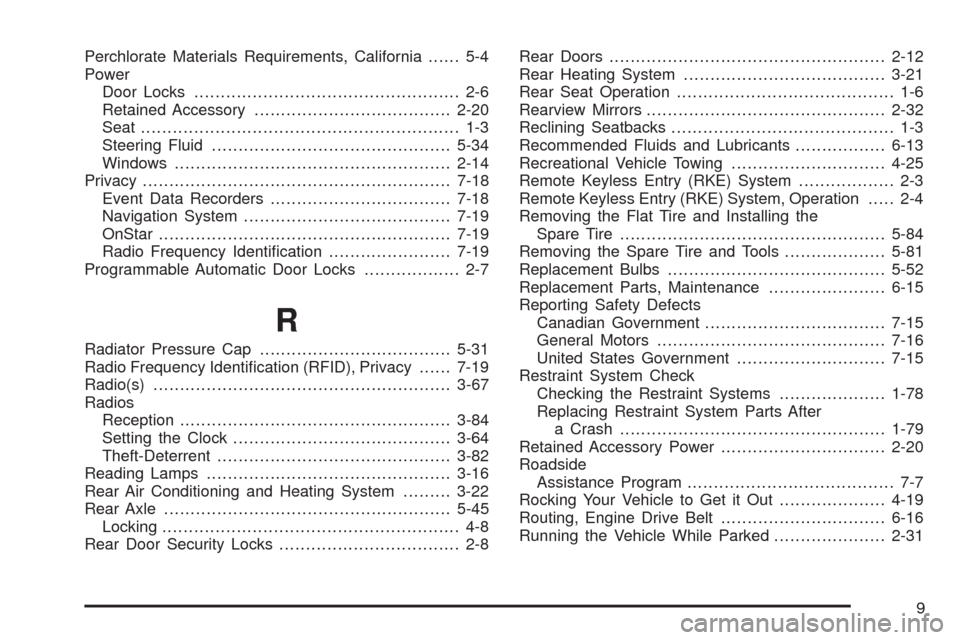
Perchlorate Materials Requirements, California...... 5-4
Power
Door Locks.................................................. 2-6
Retained Accessory.....................................2-20
Seat ............................................................ 1-3
Steering Fluid.............................................5-34
Windows....................................................2-14
Privacy..........................................................7-18
Event Data Recorders..................................7-18
Navigation System.......................................7-19
OnStar.......................................................7-19
Radio Frequency Identification.......................7-19
Programmable Automatic Door Locks.................. 2-7
R
Radiator Pressure Cap....................................5-31
Radio Frequency Identification (RFID), Privacy......7-19
Radio(s)........................................................3-67
Radios
Reception...................................................3-84
Setting the Clock.........................................3-64
Theft-Deterrent............................................3-82
Reading Lamps..............................................3-16
Rear Air Conditioning and Heating System.........3-22
Rear Axle......................................................5-45
Locking........................................................ 4-8
Rear Door Security Locks.................................. 2-8Rear Doors....................................................2-12
Rear Heating System......................................3-21
Rear Seat Operation......................................... 1-6
Rearview Mirrors.............................................2-32
Reclining Seatbacks.......................................... 1-3
Recommended Fluids and Lubricants.................6-13
Recreational Vehicle Towing.............................4-25
Remote Keyless Entry (RKE) System.................. 2-3
Remote Keyless Entry (RKE) System, Operation..... 2-4
Removing the Flat Tire and Installing the
Spare Tire..................................................5-84
Removing the Spare Tire and Tools...................5-81
Replacement Bulbs.........................................5-52
Replacement Parts, Maintenance......................6-15
Reporting Safety Defects
Canadian Government..................................7-15
General Motors...........................................7-16
United States Government............................7-15
Restraint System Check
Checking the Restraint Systems....................1-78
Replacing Restraint System Parts After
a Crash..................................................1-79
Retained Accessory Power...............................2-20
Roadside
Assistance Program....................................... 7-7
Rocking Your Vehicle to Get it Out....................4-19
Routing, Engine Drive Belt...............................6-16
Running the Vehicle While Parked.....................2-31
9
Page 406 of 408
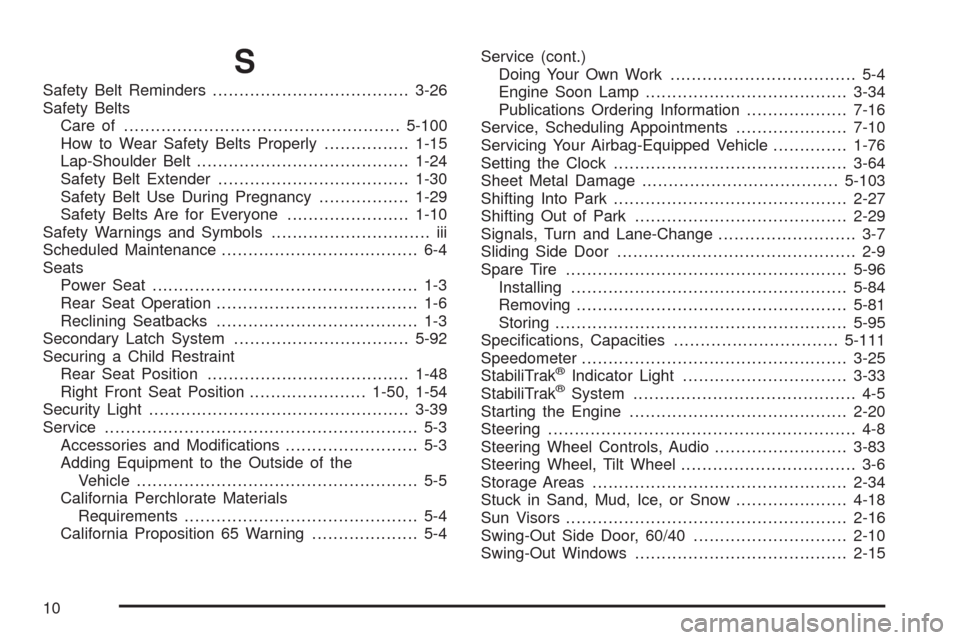
S
Safety Belt Reminders.....................................3-26
Safety Belts
Care of ....................................................5-100
How to Wear Safety Belts Properly................1-15
Lap-Shoulder Belt........................................1-24
Safety Belt Extender....................................1-30
Safety Belt Use During Pregnancy.................1-29
Safety Belts Are for Everyone.......................1-10
Safety Warnings and Symbols.............................. iii
Scheduled Maintenance..................................... 6-4
Seats
Power Seat.................................................. 1-3
Rear Seat Operation...................................... 1-6
Reclining Seatbacks...................................... 1-3
Secondary Latch System.................................5-92
Securing a Child Restraint
Rear Seat Position......................................1-48
Right Front Seat Position......................1-50, 1-54
Security Light.................................................3-39
Service........................................................... 5-3
Accessories and Modifications......................... 5-3
Adding Equipment to the Outside of the
Vehicle..................................................... 5-5
California Perchlorate Materials
Requirements............................................ 5-4
California Proposition 65 Warning.................... 5-4Service (cont.)
Doing Your Own Work................................... 5-4
Engine Soon Lamp......................................3-34
Publications Ordering Information...................7-16
Service, Scheduling Appointments.....................7-10
Servicing Your Airbag-Equipped Vehicle..............1-76
Setting the Clock............................................3-64
Sheet Metal Damage.....................................5-103
Shifting Into Park............................................2-27
Shifting Out of Park........................................2-29
Signals, Turn and Lane-Change.......................... 3-7
Sliding Side Door............................................. 2-9
Spare Tire.....................................................5-96
Installing....................................................5-84
Removing...................................................5-81
Storing.......................................................5-95
Specifications, Capacities
...............................5-111
Speedometer..................................................3-25
StabiliTrak
®Indicator Light...............................3-33
StabiliTrak®System.......................................... 4-5
Starting the Engine.........................................2-20
Steering.......................................................... 4-8
Steering Wheel Controls, Audio.........................3-83
Steering Wheel, Tilt Wheel................................. 3-6
Storage Areas................................................2-34
Stuck in Sand, Mud, Ice, or Snow.....................4-18
Sun Visors.....................................................2-16
Swing-Out Side Door, 60/40.............................2-10
Swing-Out Windows........................................2-15
10